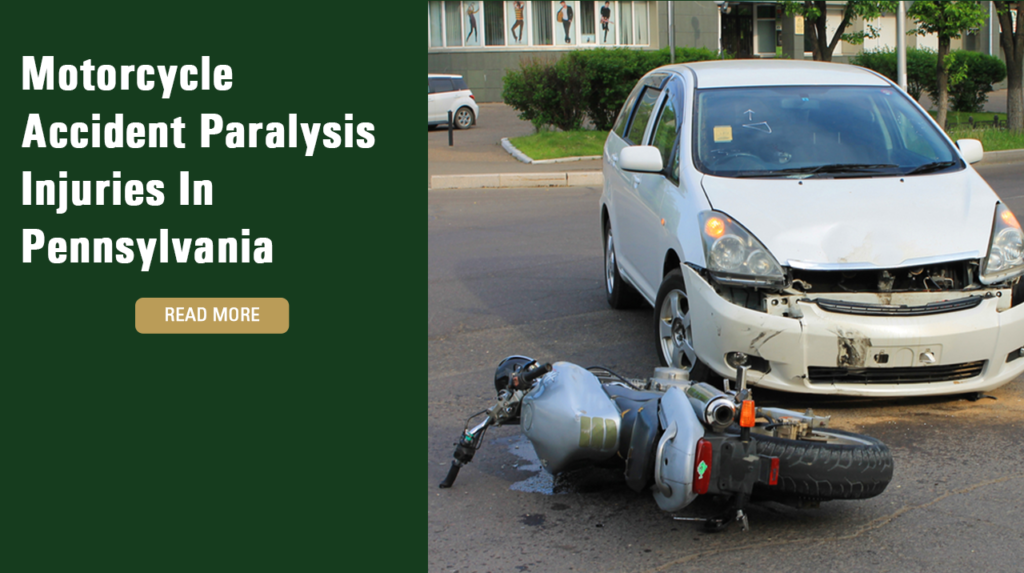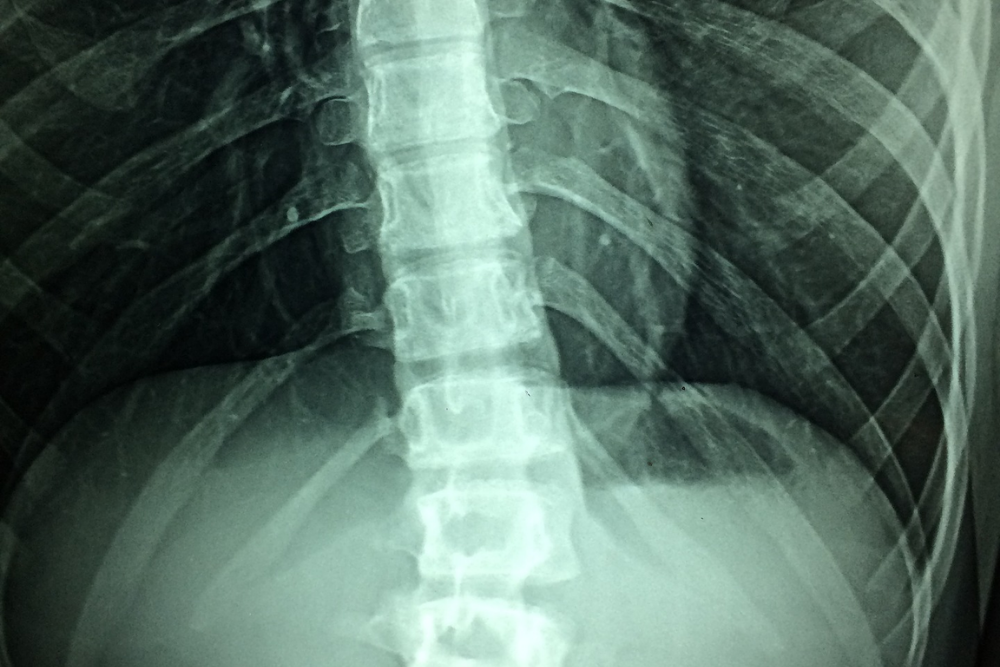Motorcycle Accident Paralysis Injuries In Pennsylvania

Among the types of motor vehicle crashes that happen in Pennsylvania, some of the most catastrophic involve motorcycles. Motorcycle riders are not required to wear helmets in the Commonwealth, and they are largely unprotected from the forces released in collisions. Unlike passenger vehicle occupants, motorcycle riders do not have a steel frame around them to absorb some of the forces released in accidents and instead absorb them with their bodies. The consequences of a motorcycle crash can include devastating injuries or fatalities and can permanently change the lives of the victims. One of the most serious types of injuries that you might suffer in a motorcycle wreck is a spinal cord injury resulting in paralysis. Here is what you should know about paralysis following a motorcycle crash and your potential rights to compensation.
The Different Kinds Of Paralysis
The spinal cord is critical to your ability to move and sense the environment around you. Your peripheral nerves carry messages from different parts of your body to the spinal cord, which is a bundle of nerves that transmits those signals to your brain. The brain also sends messages back to various areas of your body through the spinal cord to tell the various areas of your body how to respond to different stimuli in the environment. Many people who are involved in motorcycle crashes suffer severe injuries to their backs and necks, including damage to the spinal cord. Spinal cord injuries are fairly common in motorcycle crashes, and some people do not suffer any other injuries than spinal cord injuries in motorcycle wrecks. If you suffer an injury to your spinal cord in a motorcycle accident, you might experience a variety of different symptoms. Some of the types of symptoms that might indicate a spinal cord injury include a loss of sensation or numbness in your legs, arms, or back. You might also be unable to move your limbs. To confirm that you have suffered a spinal cord injury, doctors in the emergency department will conduct a number of tests. One type of complication of a spinal cord injury is paralysis, which involves a loss of sensation and motor function in affected parts of your body. Depending on the severity and location of the injury, you might experience localized, generalized, or full-body paralysis. This condition can be temporary or permanent.
Generalized paralysis occurs when an entire area of your body is paralyzed and can include the following four types:
- Quadriplegia – paralysis from the neck down caused by a spinal cord injury in the cervical spine region
- Paraplegia – paralysis from the waist down caused by a spinal cord injury in the thoracic or lumbar region of the spine
- Hemiplegia – paralysis of one arm and one leg, which normally affects one side of your body
- Monoplegia – Paralysis of one arm or one leg

When people suffer from quadriplegia or paraplegia, they also lose their bowel, bladder, and reproductive functioning. Suffering paralysis in a motorcycle wreck can permanently alter the course of your life in an instant and leave you with lifelong disabilities.
Managing Paralysis After A Motorcycle Accident
Most motorcyclists who suffer paralysis following collisions will require extensive and ongoing treatment.
If you are paralyzed, you might require the following types of treatment both in the immediate aftermath of your wreck and on an ongoing basis:
- Prescription medication
- Surgeries
- Rehabilitation
- Physical therapy
If you suffer quadriplegia or paraplegia, you will also likely need the following types of care:
- Catheterization
- Bowel training
- Physical, occupational, and vocation therapy on an ongoing basis
- Assisted breathing if the chest is paralyzed
- Sexual dysfunction and disability counseling
Prompt medical attention following a spinal cord injury is critical. Early intervention might help to reduce the effects of the injury and help you to regain some degree of sensation and functioning.
Complications With Paralysis
Losing the ability to sense the environment and to control your movements affects more than your muscles and can also impact other bodily functions. For example, if you experience paralysis from the chest down, you might not be able to breathe on your own and require assistive breathing devices such as a ventilator.
Many paralyzed motorcycle accident victims also suffer bowel and bladder problems as complications of their spinal cord injuries. If you suffer quadriplegia or paraplegia, you might also need a catheter, surgery, and a bowel training program. Another complication you might suffer is a loss of sexual functioning. Your doctor might recommend medication and other therapies to help.
The types of treatment you might receive will depend on the severity of your injury, its extent, and the complications you suffer. Some people will need mobility aids to be able to move around within their environments, including wheelchairs. If you are in a wheelchair, you might also need to have modifications completed on your home and purchase and learn to drive a vehicle with modified controls.

Compensation To Motorcycle Accident Victims & How A Motorcycle Accident Attorney Can Help
If you were injured in a motorcycle accident and suffered paralysis because of the actions of another motorist, you might be entitled to pursue compensation for your losses. A Philadelphia motorcycle accident attorney can review your case and value it so that you understand what your claim might be worth.
Some of the types of damages that you might recover following a paralyzing motorcycle crash include the following:
- Past and future medical expenses to treat your spinal cord injuries and paralysis
- Past and future rehabilitation and physical therapy costs
- Past and future wage losses
- Attendant care costs
- Home modification costs
- Medical equipment costs
- Assistive device costs
- Physical pain and suffering
- Emotional trauma
- Disability
- Disfigurement/scarring
- Loss of the enjoyment of life
- Loss of consortium for your spouse
- Others
Motorcycle crashes resulting in paralysis frequently involve complex litigation. When the injuries are severe and extensive, insurance companies might fiercely defend against the claims to try to minimize the amounts they might be forced to pay. In some cases, the losses might exceed the policy limits of the at-fault driver’s insurance policy. Your attorney can fully investigate your claim to determine liability and identify all potential sources of recovery, which might help to maximize your compensation amount.
Speak To A Motorcycle Accident Attorney At Raynes & Lawn
Being paralyzed in a motorcycle wreck because of the negligence of someone else can be devastating. If you or your loved one has sustained this type of injury, you should speak to one of the attorneys at Raynes & Lawn. We have decades of experience and can help you understand the legal merits of your claim and the potential avenues of recovery. Contact us today for a free consultation by calling 1-800-535-1797.

For the general public: This Blog/Website is made available by the law firm publisher, Raynes & Lawn, for educational purposes. It provides general information and a general understanding of the law but does not provide specific legal advice. By using this site, commenting on posts, or sending inquiries through the site or contact email, you confirm that there is no attorney-client relationship between you and the Blog/Website publisher. The Blog/Website should not be used as a substitute for competent legal advice from a licensed attorney in your jurisdiction.
For attorneys: This Blog/Website is informational in nature and is not a substitute for legal research or a consultation on specific matters pertaining to your clients. Due to the dynamic nature of legal doctrines, what might be accurate one day may be inaccurate the next. As such, the contents of this blog must not be relied upon as a basis for arguments to a court or for your advice to clients without, again, further research or a consultation with our professionals.
